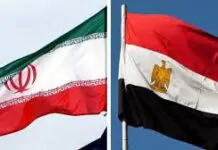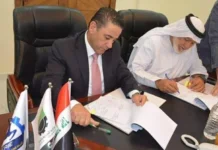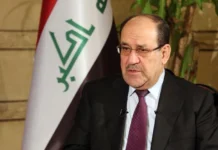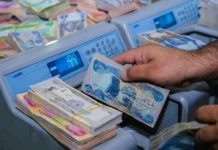Tishwash: Al-Sudani will visit Doha tomorrow to participate in the World Security Forum
A political source reported today, Sunday (May 19, 2024), the visit of Prime Minister Muhammad Shiaa Al-Sudani to the Qatari capital, Doha.
The source told “Baghdad Al-Youm”, “Prime Minister Muhammad Shiaa Al-Sudani will head tomorrow, Monday, to the Qatari capital, Doha.”
He added, “The reason for the visit is to participate in the 2024 World Security Forum.”
The activities of the Global Security Forum will begin tomorrow in Doha, and will continue until the 22nd of this month with broad participation from officials, decision makers and policy makers.
The forum witnesses in-depth discussions on many sensitive issues related to global security, with the aim of addressing and discussing the challenges and opportunities posed by the interconnected world link
Tishwash: Iraqi Parliament adjourns amid chaos: Failure to elect Speaker leads to physical altercations
As speculated, and in a recurring scenario, the Iraqi Parliament adjourned its session on Saturday evening to an unspecified date after failing to reach a decisive third round in the election of its president.
The competition remained intense between the Siyada bloc’s Salem Al-Issawi and the Taqadum Bloc-backed Mahmoud Al-Mashhadani.
The scene did not differ much from January 3, 2024, as leaked by MPs about today’s session, marked by verbal altercations, and physical scuffles, reminiscent of events witnessed and reported five months ago, orchestrated by members of the Taqadum Party under the leadership of Mohammed Al-Halbousi.
MPs’ smartphones captured heated verbal exchanges and physical confrontations between members of the Taqadum Party and colleagues from other blocs over the election of the parliament’s president.
Mishaan al-Jubouri, a leader in the Siyada Party, posted on the X, ” When the quorum reached 190 deputies, Taqadum’s MPs set up a barrier between the seats and the presidency platform.”
Al-Jubouri added that “MP Haibat Al-Halbousi from Taqadum assaulted Muthanna Al-Samarrai, the head of the Azm bloc, prompting MP Ahmed al-Jubouri to strike Haibat.”
This incident highlights the tensions and physical confrontations that marred the proceedings during the parliament’s session.
Prior to this, MPs from Taqadum demanded amendments to the parliament’s internal regulations before proceeding with the voting round, fearing Salem Al-Issawi’s potential victory in the third round, according to a parliamentary source.
While the quorum was complete, several Taqadum MPs opposed proceeding with the vote unless the internal regulations of the parliament were amended.
These demands led to chaos inside the council, escalating later into physical brawls and verbal abuse between MPs from the Taqadum Party and others from different blocs, as shown in leaked footage.
Yet again, the Iraqi Parliament failed to elect a new president in its second round of voting, which saw intense competition between Al-Issawii and Al-Mashhadani. The former garnered 158 votes while the latter received 137 votes.
Against the backdrop of this vote convergence, a state of division prevailed among political blocs. The Siyada and Al-Azm, alongside others aligned with them, as well as MPs supporting Salem Al-Issawi, insisted on continuing the session and initiating a third round to elect a new parliament president.
However, other blocs, including the State of Law, Taqadum, and Al-Sadara, supporting Mahmoud Al-Mashhadani for the parliament presidency, pushed for postponing the session to a later date, according to a parliamentary source.
Notably, on November 14, 2023, the Federal Supreme Court, the highest judicial authority in Iraq, decided to end the membership of Parliament Speaker Mohammed al-Halbousi. Then, the Iraqi Parliament officially terminated his membership on November 21, 2023.
On January 13, the Iraqi Parliament held an extraordinary session to choose the new Speaker. However, due to verbal altercations inside the council hall, the session was adjourned without completing the election process.
Nearly half a year after the dismissal of Al-Halbousi, the parliamentary council has again failed, for the fifth time, to settle the issue, thereby stalling the enactment of crucial legislation. link
************
CandyKisses: Cabinet holds extraordinary session to discuss budget tables for 2024
Shafaq News / The Council of Ministers held, on Sunday, an extraordinary session chaired by Prime Minister Mohamed Shia Al-Sudani to discuss the tables of the federal budget for the year 2024.
This session comes as Al-Sudani is scheduled to head tomorrow, Monday, to the Qatari capital, Doha, to participate in the Global Security Forum for the year 2024.
At the end of April, Acting Speaker of the House of Representatives Mohsen al-Mandalawi agreed with Prime Minister Mohamed Shia al-Sudani on the need to complete the schedules of the 2024 budget law and expedite sending them to the House of Representatives for discussion and voting, as they are related to the lives of citizens and focus on investment spending for new projects.
In the meantime, the Ministry of Finance referred to the controls contained in the circular of the Budget Department No. 69333 on 24/4/2024 to all ministries, which must be taken into account when approaching the department for the following purposes:
● Transfer of services from one destination to another.
• Request for a grade and job title on political segregation.
● Change job titles.
● Change the address of the unauthorized certificate upon appointment.
● Marking variables: (promotion / calculation of the certificate in accordance with Law No. 103 of 2012 / calculation of the duration of the contract and wage / previous services, press service and service of practicing the legal profession).
● Indication of the period of calculation of the political chapter.
● Promotion to the position of expert.
● Marking of variables of self-financing circles.
************
Tishwash: Paying off external debt is a step to promote stability and recovery
Experts in the field of economics expressed their confidence in the economic and financial reform steps undertaken by the current government under the direct supervision and guidance of Prime Minister Muhammad Shiaa Al-Sudani, and while they pointed out that Iraq’s payment of its foreign debts is a supportive step for financial and economic stability and moving towards recovery, they called for Accelerating the steps to move away from the framework of the “mono-rentier economy” towards a multi-resource economy.
The head of the “Osoul” Foundation for Economic and Sustainable Development, Khaled Al-Jabri, said in an interview with “Al-Sabah”: “Iraq’s payment of all its debts to the International Monetary Fund is a positive step towards enhancing economic stability and improving the country’s financial situation,” indicating that “this achievement has implications.” “There are multiple impacts on the Iraqi economy, in terms of improving the credit rating, as repaying debt enhances Iraq’s credit rating, which may reduce borrowing costs in the future, and it also reflects the country’s ability to fulfill its financial obligations, which increases the confidence of international lenders and investors.”
He added, “Enhancing international confidence confirms Iraq’s commitment to financial and economic reforms and can attract more foreign investments, as investors see that the financial environment has become more stable, and that the financial resources (money) that were used to repay debts can now be allocated to development projects.” And infrastructure, and can contribute to improving public services and increasing spending on health and education.”
Today, Thursday, the Advisor to the Prime Minister for Financial Affairs, Mazhar Muhammad Salih, announced that Iraq has fully repaid all loans provided by the International Monetary Fund since 2003, noting that their total did not exceed 8 billion dollars.
The head of the Al-Sharq Center for Strategic Studies and Information, Ali Mahdi Al-Araji, explained in an interview with “Al-Sabah” that “Iraq’s total debt amounts to about 70 billion dollars, divided into an internal debt worth 50 billion dollars scheduled between the Iraqi banking system and the three government banks (Al-Rasheed, Al-Rafidain, and Al-Basra). Iraqi Trade), and the other part is an external debt amounting to 20 billion dollars, meaning that in total it constitutes only 35 percent of the country’s gross domestic product.
He explained, “Iraq – as it is known – is a rentier country that depends on oil, and this is offset by a significant real exhaustion of the state budget estimated at $42 billion that goes annually between job salaries, retirement, and social care. Perhaps we will face in the future what is called (the Dutch disease), where reliance on… Natural resources and the collapse or decline of the industrial side.
Al-Araji expressed his confidence in “the great efforts of Prime Minister Muhammad Shiaa Al-Sudani to resolve the financial crises in Iraq,” stressing that “we find them to be good steps. There must be a wise administration that controls the country’s cash reserves and seeks to achieve harmony and balance between operational and investment expenses and… Its imports, and repairing the deficit in the trade balance, budget, and payments, to avoid any financial crisis that may afflict the country.” link






